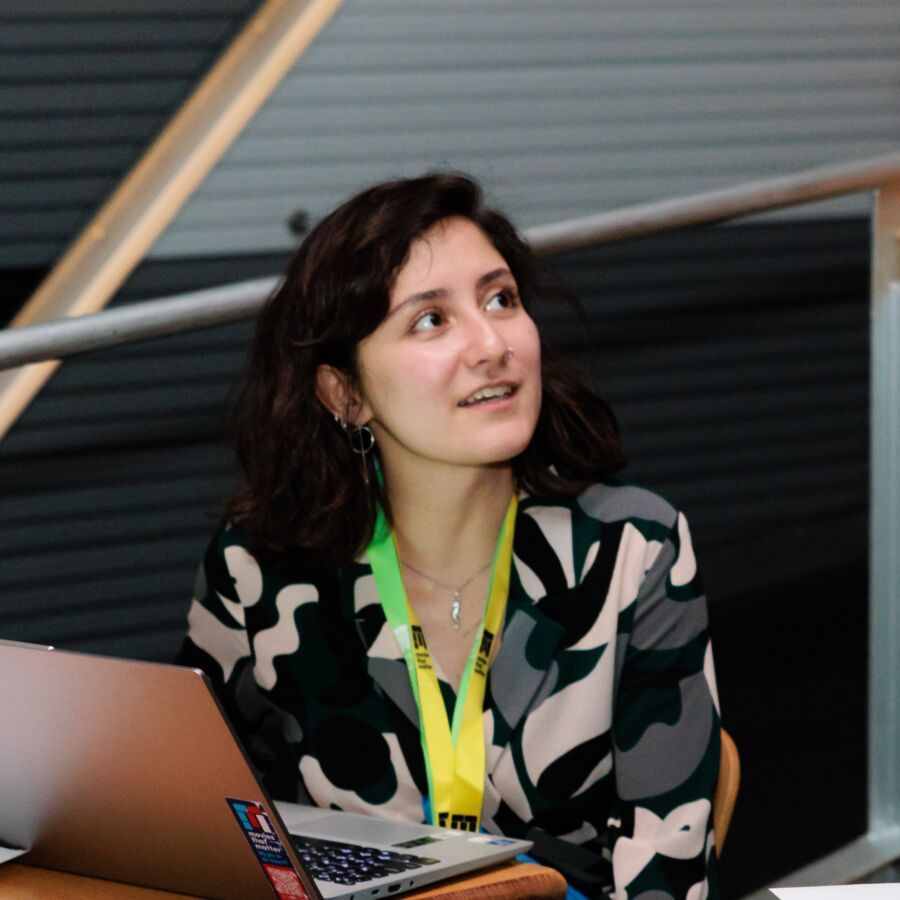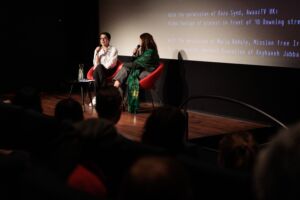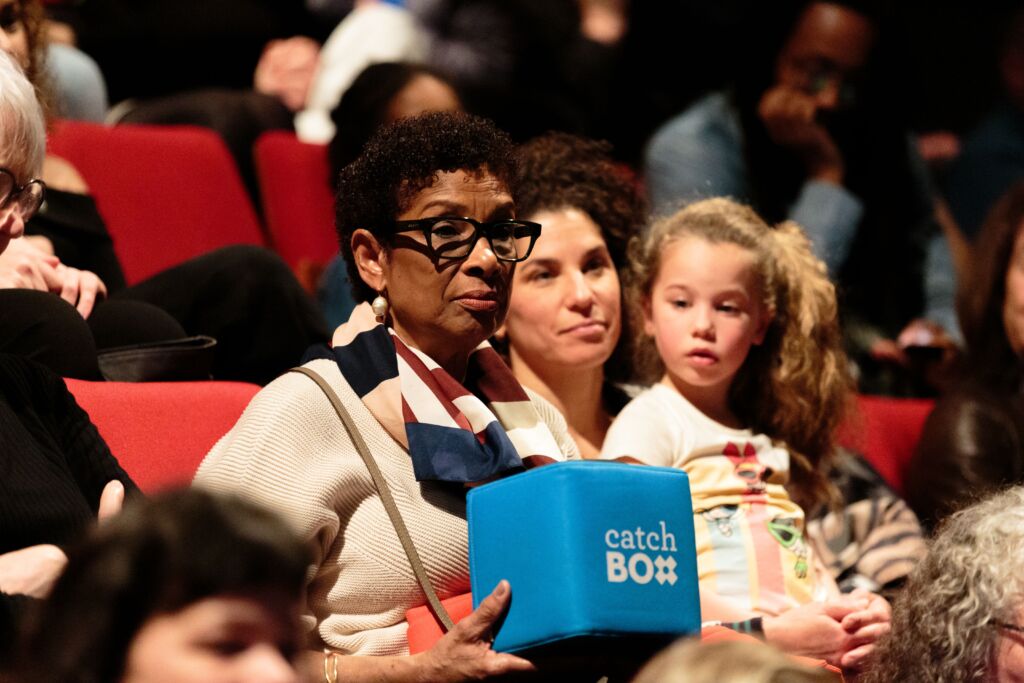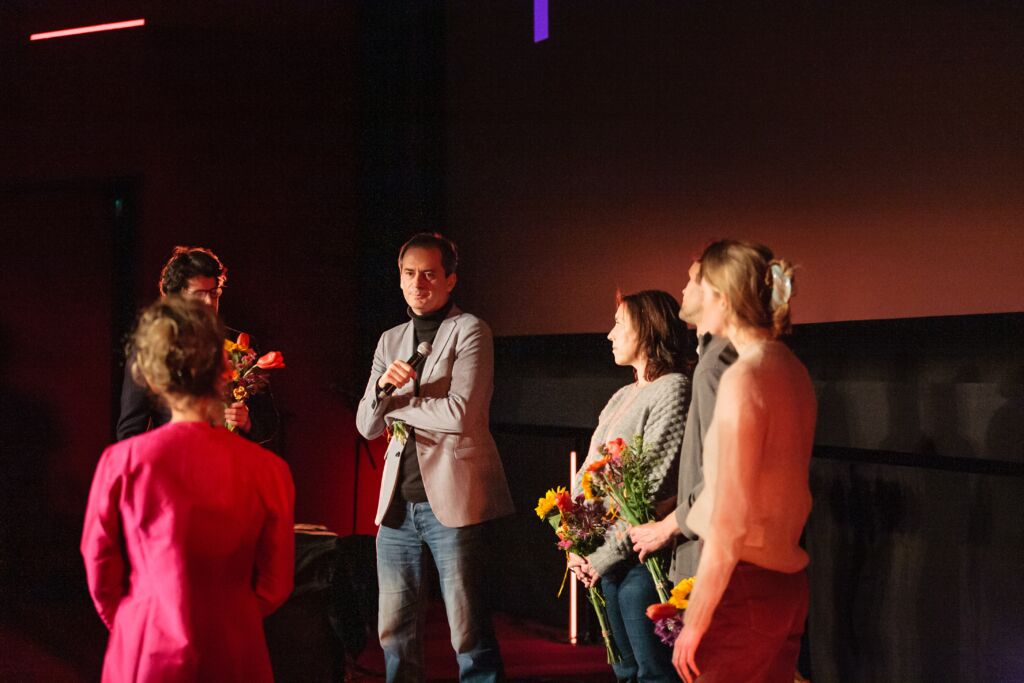Meet the Team: İmge Erdural
Curious about how the in-depth programmes at the Movies that Matter Festival come together? We spoke with İmge, one of the driving forces behind the engaging discussions, Q&A sessions, and other performances around the films at the festival. 04 March, 2024

İmge works as a producer for the In-depth Programme at Movies that Matter. She was born and raised in Utrecht but has been living in Amsterdam for the past few years. She completed her studies in Media & Culture at the University of Amsterdam. Imge started as a programme intern at Movies that Matter four years ago and later returned as a producer for the in-depth programme.
What do you do at Movies that Matter?
‘As the assistant for the in-depth programme, I am involved in the execution of everything we programme around the films at our festival, whether it is the introductions to a film, discussions, Q&A sessions, or other in-depth programmes. This means that from the moment films are selected for the festival, we are engaged and brainstorming about potential in-depth programmes that we would like to create. We need to be selective about which films we create an in-depth programme for, as unfortunately, we do not have the capacity to develop an extensive in-depth programme for every film. Usually, we prefer to develop in-depth programmes for films that address underrepresented or highly current topics. After selecting the films for an in-depth programme, we conduct thorough research by gathering background information about the film, including details about the filmmaker, the film’s subject, the history of that subject, and key events or individuals involved. Our goal is to provide a valuable and profound addition to the film experience during the festival in this way.’

What makes offering an in-depth programme for a film so important according to you?
‘I actually consider the in-depth programmes to be just as important as the films themselves. At Movies that Matter, we aim to promote dialogue on diverse topics. The film often serves as the initial step towards this goal, as it introduces you to the subject and presents certain aspects of it. Our goal in providing in-depth programme is twofold. On the one hand, we find it crucial to keep the discussion alive regarding the topics addressed in the films. I always hope that visitors, by participating in discussions or Q&A sessions, gain that extra bit of insight that prompts them to contemplate a specific subject. On the other hand, we strive to expand on the knowledge and insights offered by the film so that the audience can learn more about the subject, discover possible alternative perspectives, and acquire deeper insights. That is what we aim to achieve with the offering of our in-depth programmes.’

How do you approach facilitating discussions around sensitive topics?
‘We always strive to consider all sensitivities in our in-depth programmes. Once we know that we are going to develop an in-depth programme for a film, we start thinking thoroughly about various aspects. We evaluate what the film precisely communicates, whether it takes a specific stance, and if diverse perspectives are addressed. Our goal is to expand on the content of the film, for example, during a post-screening discussion. Furthermore, we explore how we can ensure that people continue to reflect on this topic and how we can illuminate different perspectives in an in-depth programme. In this, we find it crucial that everything is in balance. In our in-depth programmes, and in our festival as a whole, there is room for everyone. Promoting dialogue and engaging in continuous conversations with each other is essential. We feel responsible for creating a safe space in our in-depth programmes so that people feel comfortable engaging in conversations with those who may have different opinions, if they wish to do so. The moderator is always a crucial factor in this. Therefore, we carefully select them, especially when dealing with sensitive topics. It often involves someone who is knowledgable about the subject but not overly biased, allowing the moderator to facilitate dialogue without impeding it. Moreover, moderators are often experienced in dealing with audiences where diverse opinions or strong emotions may be present. They possess the necessary skills to effectively handle such situations, and, of course, they are also informed from our side.’

How do you choose guests for the post-screening discussions?
‘That depends somewhat on the competitions of the festival. For example, part of the Activist competition is that all activists are present. Therefore, the in-depth programmes in this competition often include the activists, as well as filmmakers or other interesting individuals or organizations. For other competitions, we always look broadly at the people we invite for an in-depth programmes. If the filmmakers are able to be present at our festival, we often involve them in the in-depth programme. When they cannot attend the festival, we look around us to find other individuals or organizations that could be interesting for an in-depth programme related to a film. This can include doctors, lawyers, experts with personal experience, or non-profit organizations. In any case, it involves people or organizations with significant knowledge about the subject and the material, capable of participating in a meaningful post-screening discussion. For example, for our opening film Navalny in 2022, we had Bulgarian investigative journalist and author Christo Grozev (from the investigative journalism platform Bellingcat) and Russian investigative journalist and anti-corruption activist Maria Pevchikh as guests, discussing the human rights situation in Russia and the circumstances surrounding the recently deceased Russian opposition leader Alexei Navalny. In the same year, we also had epidemiologist Marion Koopmans as a guest at the world premiere of Time of Pandemics, discussing how we can only manage future pandemics with a fair global distribution of healthcare and medications. So, the guests we invite are carefully chosen to complement the films and promote dialogue around the film or interaction with the audience.’
What will you primarily be working on in the upcoming period?
‘The film programme for the festival is now almost complete. For us, this means that we can actually start setting up the in-depth programmes and ancillary events. While we have already started on this to some extent, we can now make real progress. Our next goal is to approach various interesting guests, whether they are professors, non-profit organizations, professionals from the film festival sector, or experts with personal experience, to see if they are interested in participating in our in-depth programmes. Additionally, in the coming period, we will delve deeper into possible perspectives for in-depth programmes, especially in the case of films with a broad spectrum. For this, we will conduct extensive research in the coming weeks using articles, other films, and so on. In this way, our in-depth programmes are gradually taking shape.’
